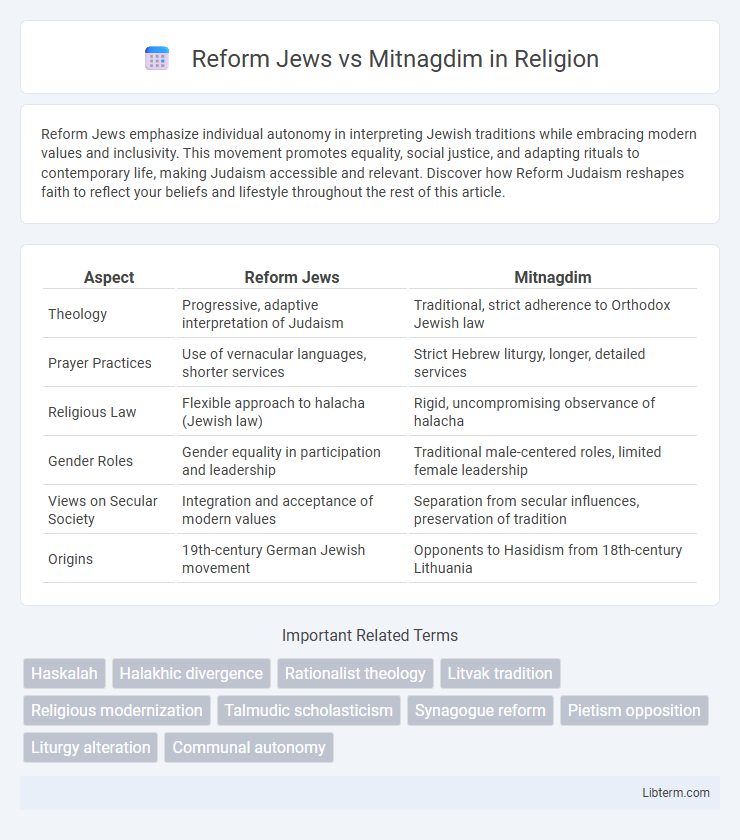Reform Jews emphasize individual autonomy in interpreting Jewish traditions while embracing modern values and inclusivity. This movement promotes equality, social justice, and adapting rituals to contemporary life, making Judaism accessible and relevant. Discover how Reform Judaism reshapes faith to reflect your beliefs and lifestyle throughout the rest of this article.
Table of Comparison
| Aspect | Reform Jews | Mitnagdim |
|---|---|---|
| Theology | Progressive, adaptive interpretation of Judaism | Traditional, strict adherence to Orthodox Jewish law |
| Prayer Practices | Use of vernacular languages, shorter services | Strict Hebrew liturgy, longer, detailed services |
| Religious Law | Flexible approach to halacha (Jewish law) | Rigid, uncompromising observance of halacha |
| Gender Roles | Gender equality in participation and leadership | Traditional male-centered roles, limited female leadership |
| Views on Secular Society | Integration and acceptance of modern values | Separation from secular influences, preservation of tradition |
| Origins | 19th-century German Jewish movement | Opponents to Hasidism from 18th-century Lithuania |
Historical Origins of Reform Judaism and Mitnagdim
Reform Judaism originated in early 19th-century Germany as a response to the Enlightenment and modernity, emphasizing ethical monotheism and adapting religious practices to contemporary life. The Mitnagdim emerged in the 18th century in Eastern Europe, strongly opposing the Hasidic movement and prioritizing traditional Talmudic scholarship along with strict adherence to Jewish law (Halacha). This ideological divide marked Reform Jews as advocates for religious modernization, while Mitnagdim remained staunch defenders of classical Orthodoxy and ritual observance.
Core Beliefs and Philosophical Differences
Reform Jews emphasize individual autonomy in interpreting Jewish law, prioritizing ethical principles and evolving religious practices to align with modern values, while Mitnagdim strictly adhere to traditional Halacha and Talmudic study as central to Jewish life. Reform Judaism advocates for gender equality, inclusivity, and a dynamic approach to rituals, contrasting sharply with the Mitnagdim's commitment to preserving established customs and rigorous observance. The core philosophical divide lies in Reform's progressive adaptation versus Mitnagdim's preservation of classical Orthodox Judaism.
Attitudes Toward Jewish Law (Halacha)
Reform Jews interpret Jewish law (Halacha) as a dynamic, evolving framework, often emphasizing ethical principles over strict legal adherence, allowing personal autonomy in religious practice. Mitnagdim maintain a traditionalist stance, upholding Halacha as binding and authoritative, with a rigorous commitment to classical rabbinic interpretations and customs. This fundamental divergence shapes their distinct approaches to ritual observance, community norms, and religious identity within Judaism.
Worship Practices and Synagogue Rituals
Reform Jews emphasize egalitarian worship practices, incorporating vernacular languages alongside Hebrew in synagogue rituals, and often adapt traditional prayers to reflect modern values. In contrast, Mitnagdim maintain strict adherence to Orthodox halachic standards, conducting services primarily in Hebrew with traditional liturgy and gender-segregated seating. The distinction between Reform and Mitnagdim worship highlights differing interpretations of Jewish law and the role of innovation in religious expression.
Responses to Modernity and Secularization
Reform Jews embraced modernity by adapting religious practices to align with contemporary values and secular knowledge, emphasizing ethical principles over ritual observance. Mitnagdim, or opponents of Hasidism, maintained strict adherence to traditional Jewish law and resisted secular influences to preserve religious continuity and identity. The tension reflects broader debates within Judaism on balancing tradition with secularization, influencing communal structures and educational priorities.
Relationship with Jewish Mysticism and Kabbalah
Reform Jews typically adopt a rationalist approach, often downplaying or rejecting the esoteric elements of Jewish Mysticism and Kabbalah in favor of ethical monotheism and modern values. Mitnagdim, historically opposing Hasidic enthusiasm, maintain a cautious yet respectful stance toward Kabbalistic teachings, valuing their scholarly tradition without fully embracing Hasidic mystical practices. Both groups demonstrate differing relationships with Kabbalah shaped by theological priorities and historical contexts within Jewish thought.
Educational Approaches and Torah Study
Reform Jews prioritize inclusive, flexible educational approaches emphasizing ethical teachings and modern interpretations of Torah to align with contemporary values. Mitnagdim adhere strictly to traditional Torah study, focusing on rigorous Talmudic analysis and classical Jewish texts within yeshiva frameworks. The divergence reflects broader philosophical differences, with Reform Judaism embracing adaptation and Mitnagdim maintaining classical Halakhic disciplines.
Community Structure and Leadership
Reform Jewish communities emphasize egalitarian leadership and democratic decision-making, often featuring inclusive rabbis, cantors, and lay leaders who prioritize individual autonomy and progressive values. Mitnagdim, traditionally opposing Hasidic movements, maintain hierarchical leadership structures centered around established rabbis and a more stringent adherence to Halacha, reinforcing communal authority and continuity. The organizational frameworks in Reform Judaism encourage adaptive practices and diverse participation, while Mitnagdim communities preserve rigid roles and centralized rabbinical guidance to uphold traditional religious norms.
Role of Women in Religious Life
Reform Judaism promotes gender equality, allowing women to fully participate in religious rituals, including serving as rabbis and cantors, reflecting its progressive stance on gender roles. In contrast, the Mitnagdim, rooted in traditional Orthodox principles, generally restrict women's roles in religious services, emphasizing separate seating and limited ritual participation. This divergence highlights differing interpretations of Jewish law and modernity within these communities.
Contemporary Challenges and Future Outlook
Reform Jews face challenges integrating modern values with traditional Jewish law, often emphasizing inclusivity and gender equality, while Mitnagdim prioritize strict adherence to Halacha and preserving historical rituals. Contemporary debates include balancing religious observance with secular society and addressing interfaith relationships, impacting communal cohesion and identity. The future outlook suggests increasing dialogue and potential convergence on shared cultural values amid evolving social landscapes.
Reform Jews Infographic

 libterm.com
libterm.com